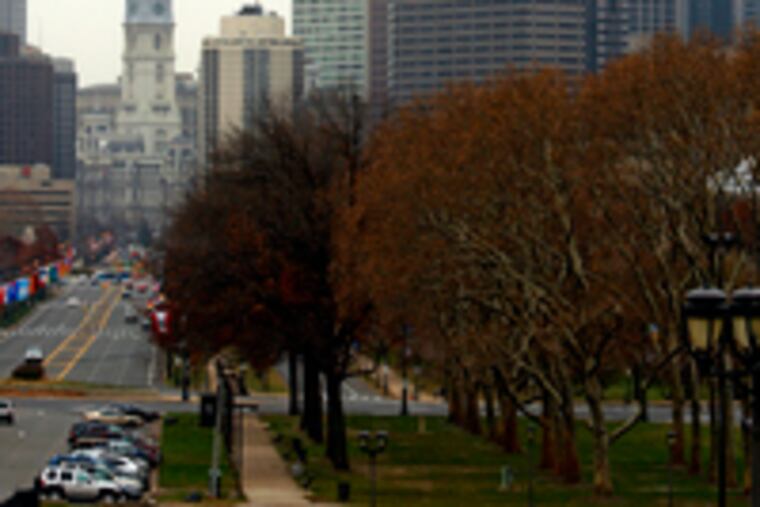
If Center City has bigger hotels, better restaurants, costlier homes and more residents than it did at the end of the last wave of skyscraper construction in the early 1990s, one thing hasn't changed: Landlords are still pushing Class A office space at about $32 a square foot.
Space in the city's best office buildings is cheaper than it used to be, adjusted for inflation. Rents are also low compared to the going rate of $50 plus for the best space in Washington, $60 in Boston, and more than $90 on recent Manhattan leases, said Matthew Wright, research services manager at commercial brokers Grubb & Ellis Co. in Philadelphia.
It's not that the local market is flooded. Center City still has about 40 million square feet of office space, the same as in the early 1990s, before the wave of corporate layoffs that followed the sale of the big banks, insurers, railroads and manufacturers that had dominated corporate Philadelphia for the previous century.
A handful of new buildings, especially the trapezoidal Cira Center at 30th Street Station and the 1.2-million-square-foot Comcast Center at 18th and John F. Kennedy Boulevard, where the first workers are moving in this month, have added roughly enough space to replace the aging offices converted to other uses, such as the residences in Two Liberty Place, said John Gattuso, senior vice president at Liberty Property Trust, who oversees the Comcast project.
If Center City space hasn't grown, suburban offices have expanded quickly, from about 60 million square feet in 2001 to nearly 90 million, according to data from Grubb & Ellis.
Much of the added suburban space isn't completely new. "Brian O'Neill and his brother, Michael O'Neill, have personally converted millions of square feet of industrial space into offices," noted Jack Soloff, senior vice president at Grubb & Ellis. Most of that space is occupied.
Suburban vacancy rates vary, from less than 10 percent in Marlton and Cherry Hill to about 20 percent in Horsham. Speculative suburban projects like Metroplex in Plymouth Meeting and 1000 Continental in King of Prussia have been asking more than $30 a square foot, putting them on a level with One Liberty Place and other Philadelphia towers, but finding few takers.
Still, low city vacancies have some Philadelphia brokers hopeful that local rents, which advanced at roughly the rate of inflation this year, will continue higher into next year, keeping investors interested in potential new projects.
Fears that the Comcast tower would have to raid tenants from nearby buildings mobilized building owners to protest proposed tax breaks for the project in 2004. Comcast's decision to occupy most of the space itself has reduced those fears.
At first, "everyone was panicked" because Comcast had said it expected to take less than half the building, recalled Timothy Conrey, of Studley Inc.'s Philadelphia office, tenant leasing agent for the tower. In the end, he added, Comcast will occupy nearly 90 percent of its namesake tower and keep some space at Centre Square, site of its previous headquarters.
"No one anticipated that Comcast would continue to grow and would go ahead and effect the consolidation of operations to Philadelphia from other cities," said Robert Walters, senior managing director at CB Richard Ellis in Philadelphia. "The Comcast tower has been a boost to the Center City market."
Most of the growth comes not from the magic bullet of a big company relocating downtown, but from incremental growth by well-established local organizations. Law firms, including Morgan Lewis & Bockius and Buchanan Ingersoll, have been preparing new space, while some local tenants have moved operations downtown.
With rents rising through the $30s in University City as the University of Pennsylvania and Brandywine Property Trust prepare new office buildings there, Children's Hospital of Philadelphia has leased space in Center City's Wanamaker building and the University of Pennsylvania has taken space at Centre Square, said H. Hetherington Smith, Studley's Philadelphia branch manager. Smith said the mid-$30s are considered a break-even point for new construction.
Also, Unisys Corp. has been weighing the return of its head office to the city from Blue Bell, which, if it happens, will help balance Lincoln National Corp.'s recent defection to Radnor.
"There is not a sense of dread or uncertainty," Walters said. The new tower, in combination with the lower vacancy rates, "gives us hope and confidence. We hadn't had a new building in so many years."